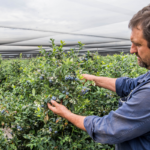Florida blueberries peak during ideal market window

The Florida blueberry season is in full swing, with growers saying that spring weather was positive for the crop, causing good pollination and leading to a plentiful and high-quality crop.
Ryan Lockman, vice president of sales and procurement at North Bay Produce says they will be in the peak of the Florida season for another week.
“The State of Florida this year should produce approximately 20-22 million pounds of fresh blueberries,” Lockman told FreshFruitPortal.com. “This is up from 14.6 million pounds from last year.”
Florida is among the 10 biggest blueberry-producing states in the United States. At the end of last year, the North American Blueberry Council (NABC) projected 2024 would bring production back to the levels witnessed over the past decade in the state.
New varieties
The University of Florida (UF) is a pioneer in varietal development for blueberries. The university recently announced two new southern highbush blueberry cultivars, set to hit the market by 2025, the "FL17-141" and "FL19-006".
Lockman said that North Bay Produce is “increasing pounds of new varieties from the University of Florida, such as Optimus and Sentinel as well as a small volume from NBP’s Sekoya Planting in Florida.”
A report from UF notes that, currently, except for small U-pick farms, Florida’s blueberry acreage consists almost entirely of southern highbush varieties, mostly developed by the University of Florida breeding program.
Even though the market window for Florida blueberries is very short, from April to early May, the timing is very profitable. Florida’s harvest when large volumes from the Southern Hemisphere have left the market.
Season challenges
Regarding any particular challenges for this season, Lockman indicated that they expect good weather, and demand is good.
“However, labor is always an issue to be dealt with,” he said.
On July 1, 2023, a new immigration law in Florida signed by Governor Ron DeSantis cracked down on undocumented labor and included penalties for businesses that employ undocumented workers.
After the announcement, Denise Negron, the executive director of the Farmworkers Coordinating Council of Palm Beach County said, “ The things we have noticed is that some of them have left the state, some of them are afraid to go out because we don't know what's going to happen.”
Since then, the Farmworkers Council has reported labor shortages not only in agriculture but also in construction.















































